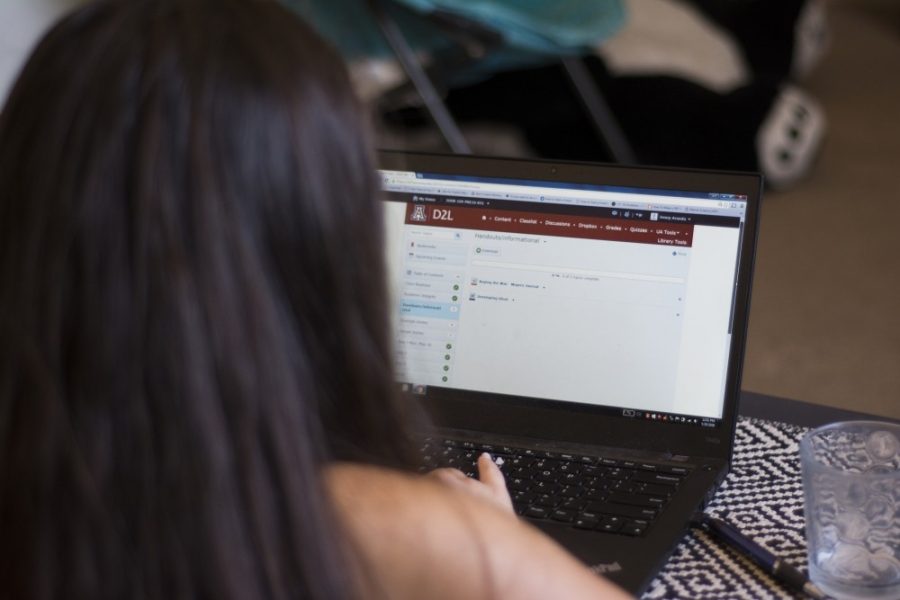Staring at a computer or laptop all day seems to be a common occurrence across the board here at the University of Arizona. Many students complain about it. It is a given with online classes that screen time will increase. However, many students have claimed that they are being given a heavier workload now than they did when they were attending school in person.
The massive amounts of stress that students are currently experiencing come from a combination of online lectures, homework and other work assignments given (not to mention an unprecedented pandemic that shows no signs of stopping). The problem is that professors seem to be adding much more homework and busy work to try and make up for not being able to meet in person, not acknowledging that the lectures themselves are work as well. Professors may not realize how much work they are actually giving students. Busy work is not a helpful tool in learning and only serves to stress students out and make them feel like they are in a cycle of never-ending class.
RELATED: EDITORIAL: Cancelling Spring Break was not the right move
This work combined with online lectures has caused students to spend most waking hours behind a computer screen. We have always known that too much screen time is unhealthy, and this phenomenon has begun to hurt students both mentally and physically. Many students are at risk of attention problems and hyperactivity when stuck sitting at a computer all day. Physically, eyes are being strained and many students are at risk of needing glasses or worsening vision, headaches or dry eyes. There are also other physical side effects like a sore back due to bad posture and a decreased amount of exercise.
This has been my experience with online school. I usually wake up at around 8 a.m. and prepare myself for the three back-to-back live online courses. I usually finish those classes around noon. I then eat lunch and continue doing my homework until about 5 p.m. and maybe eat some dinner. I attend tutoring hours for my math class and continue more homework after that until around 10 p.m. That means that on an average day, I find myself working at my computer for approximately 11 or more hours. This has in fact worsened my vision to the point that I need to have my prescription updated for my glasses. I also have started to wear a back brace while I work to make sure that I am staying upright with good posture. This does not sound normal; it would actually sound unhealthy if someone had this schedule last year. Even during a pandemic, this should not be okay.
RELATED: Zoom MD: UA first-year medical students begin their virtual education
The amount of work that professors have given their students is extremely difficult to manage and unnerving to think about. Even though I have the time to sit at my computer and have the time to complete my assignments, many students do not have this luxury. Many other students also must go to work, take care of their family or take care of any other circumstances that occur. It is extremely difficult to balance personal, work and school life now.
It is not that all students have collectively decided to be lazy or lose their work ethic, the number of assignments and busy work that is given is draining and unmanageable. I am sure that most professors do not do it on purpose, but it simply is not fair when they take extremely long to grade our assignments but they expect us to finish a week’s worth of homework within a couple of hours.
If you find yourself in this situation, there are some things you can do to help stop the negative effects of being at a computer all day. Make sure that you take some breaks, maybe walk around or get yourself a snack to eat. You can also adjust the brightness on your computer and around your dorm or home. Staring at a computer while the lights around you are off is extremely unhealthy and can cause a lot of eyestrain. Eye drops are also helpful if you find your eyes feeling a bit dry. A personal tip from me to students would be to change your location throughout the day if possible. You can work on some assignments in the living room, on your bed, in the kitchen or even outside.
RELATED: COVID-19 complicates efforts against domestic violence
If professors begin to lessen the workload given to us, we will have more of an opportunity to get outside and away from our screens. As much as we miss riding our bikes or walking to class, that isn’t possible right now, so I plead with professors to take this seriously and adjust their course load so students can break free from their laptops for good chunks of the day.
Follow Andrea Moreno on Twitter

Andrea is a freshman law major. She likes to listen to audiobooks and game in her free time.









